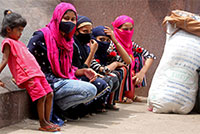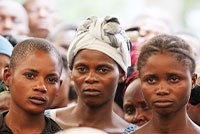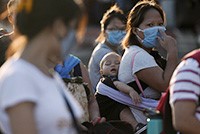Gender-based violence against women and girls
OHCHR and women’s human rights and gender equality
The Declaration on the Elimination of Violence Against Women defines "violence against women" as *any act of gender-based violence that results in, or is likely to result in, physical, sexual or psychological harm or suffering to women, including threats of such acts, coercion or arbitrary deprivation of liberty, whether occurring in public or private life."
It has taken decades of struggle by the women’s rights movement to persuade the international community to view gender-based violence against women as a human rights concern—and not just as a private matter in which the State should not interfere.
International human rights standards
In 1992, the CEDAW Committee in its General Recommendation No. 19 asserted that violence against women is a form of discrimination, directed towards a woman because she is a woman or that affects women disproportionately. This violence seriously inhibits women’s ability to enjoy rights and freedoms on a basis of equality with men.
In December 1993, the Declaration on the Elimination of Violence Against Women recognized that violence against women violates women's rights and fundamental freedoms, and called on states and the international community to work toward the eradication of violence against women.
The same year, the Vienna Declaration and Programme of Action recognized that the elimination of violence against women in public and private life is a human rights obligation. The then Commission on Human Rights condemned gender-based violence for the first time in 1994 and the same year appointed a Special Rapporteur on violence against women, its causes and consequences.
In 1995, the UN World Conference on Women held in Beijing reaffirmed the conclusions of the Vienna Conference, listing violence against women as one of the critical areas of concern.
In 2017, the CEDAW Committee, marked the 25th anniversary of its General Recommendation No. 19, by further elaborating the international standards on gender-based violence against women. In General Recommendation No. 35, the CEDAW Committee recognized that the prohibition of gender-based violence against women has evolved into a principle of customary international law, binding all States.
State’s role in addressing structural, deep-rooted discrimination
Framing gender-based violence against women as a human rights violation implies an important conceptual shift. It means recognizing that women are not exposed to violence by accident, or because of an in-born vulnerability. Instead, violence is the result of structural, deep-rooted discrimination, which the state has an obligation to address. Preventing and addressing gender-based violence against women requires legislative, administrative and institutional measures and reforms, including the eradication of gender stereotypes.
The Declaration on the Elimination of Violence Against Women and the CEDAW Committee’s General Recommendation No. 35 provide for the concept of due diligence as an obligation of States. Under this obligation, States have a duty to take positive action to prevent and protect women from violence, punish perpetrators of violent acts and compensate victims of violence. The principle of due diligence is crucial as it provides the missing link between human rights obligations and acts of private persons.
Innovative, promising new practices
Considerable progress has been made in many countries of the world. Comprehensive legal frameworks and specific institutions and policies have been put in place to promote women’s rights, prevent and protect women from violence.
There is growing awareness of the nature and impact of gender-based violence against women around the world. Innovative and promising practices are reported every year to the General Assembly, the Human Rights Council and the Commission on the Status of Women, including in the areas of investigations, prosecution and provision of services. For example:
- Commissions of Inquiry and Fact-Finding Missions have increasingly integrated a gender lens in their methodologies and analysis, enhancing the visibility of human rights violations that have affected women and girls, such as gender-based violence. The have also addressed the continuum or exacerbation of pre-existing forms of gender-based discrimination, and the differentiated impact that human rights violations and conflicts have had on women and girls.
- OHCHR collected and analysed experiences of strategic litigation (e.g. in Guatemala, DRC, Liberia, Mexico) on how to operationalize victim-centred and gender-sensitive approaches.
- Promising experiences can be found in Cambodia, Bosnia and Herzegovina, DRC, Mali, Uganda and Guatemala on how protection measures have enhanced access to justice for victims of gender-based violence, in particular sexual violence, by enabling their participation in judicial processes. These include measures against reprisals, intimidation and stigmatization, as well as the critical importance of psychological support and income-generating opportunities for victims at all the different stages of accountability processes.
One third of women globally experience violence
Yet, the figures on prevalence of gender-based violence against women are alarming. According to data by the World Health Organization, one third of women globally experience violence at least once in their lifetime.
There are still obstacles to women’s access to justice, resulting into widespread impunity for violence. Considerable efforts are still required to promote women’s and girls’ autonomy and choice and to ensure the realization of the right of women and girls to a life free from violence.
Gender-based violence in the context of COVID-19
The COVID 19 pandemic is claiming the lives of many across the globe and reports are showing the pandemic’s disproportionate impact on women and girls’ rights and how the crisis is threatening to reverse the hard won gains in advancing women’s and girls’ rights and gender equality. Reports reveal increased gender-based violence against women around the world, with surges being reported in many cases of upwards of 25%, as stated in the United Nations Policy Brief on the Impact of COVID-19 on Women (2020).
Feature stories

We must prioritize a gender-responsive recovery from COVID-19
27 July 2021

Sexual violence victims in Ituri’s conflict find a place for healing and justice
30 July 2020

Women most affected by COVID-19, should participate in recovery efforts
22 July 2020
International Day on the Elimination of Violence against Women – 25 November
22 November 2017
Joint Statement by independent UN and regional women's human rights mechanisms:
10 July 2017